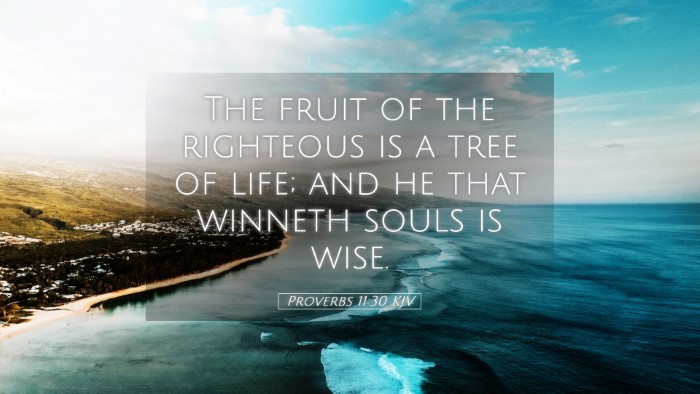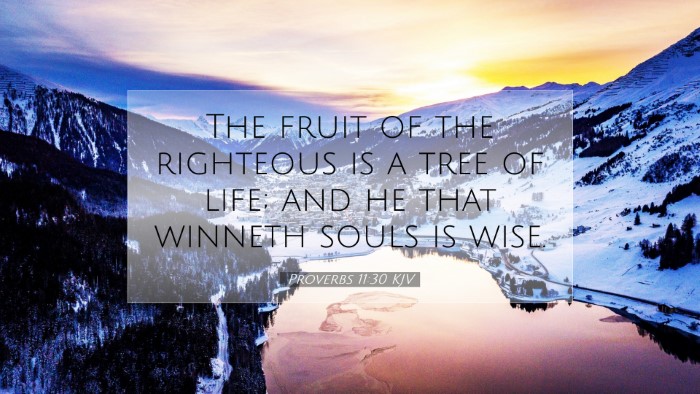Interpretation and Insights
This verse can be dissected into two primary components: the metaphor of fruit and tree, and the act of winning souls. Each carries deep theological and practical implications.
Metaphor of Righteousness
“The fruit of the righteous is a tree of life”. Here, the "fruit" signifies the outcomes and behaviors inspired by a righteous life. Matthew Henry emphasizes that righteousness not only affects the individual's life but also bears fruit that contributes to the well-being of others. It reflects the transformative nature of living according to God's will.
Tree of Life
The "tree of life," a recurring biblical motif, symbolizes vitality, sustenance, and eternal life. Albert Barnes remarks that just as a tree provides nourishing fruit, the righteous person offers spiritual nourishment to those around them. This view aligns with the New Testament concept of Christians as the light and salt of the earth (Matthew 5:13-16).
Winning Souls
Continuing with the second part of the verse, “He that winneth souls is wise.” This assertion elevates the role of evangelism and discipleship. Adam Clarke posits that this wisdom is not merely intellectual but rooted in spiritual understanding and ethical living. The wise person recognizes the value of a soul and actively engages in efforts to lead others to salvation through Christ.
Theological Implications
Proverbs 11:30 invites readers to ponder the interconnectedness of righteousness and evangelism. Each stem from a profound relationship with God and are indicative of genuine faith. As righteousness produces fruit, it becomes a catalyst for evangelistic endeavors.
- Connection Between Righteousness and Evangelism: Matthew Henry argues that a life of righteousness creates a compelling testimony that draws others toward God. Personal holiness serves as a backdrop for effective ministry.
- The Role of the Believer: Engaging in soul-winning honors God’s desire for all to be saved (1 Timothy 2:4). A wise believer cultivates not just their own fruit but facilitates growth in others.
- Outcome of Winning Souls: The joy and fulfillment in witnessing others come to faith cannot be understated. It not only exemplifies wisdom but reflects God’s love and the joy of heaven over one sinner who repents (Luke 15:7).
Practical Applications
For pastors, theologians, and students alike, this verse serves as a dual reminder: to pursue personal righteousness and to actively engage in the mission of winning souls for Christ.
- Personal Reflection: Consider how your life reflects God’s righteousness. Are you bearing fruit that blesses others and promotes spiritual vitality?
- Evangelistic Efforts: What practical steps can you take to engage in soul-winning? This might involve relationships, community service, or sharing the Gospel.
- Community Impact: Explore ways your church can serve as a tree of life within the community. How can your congregation provide hope and nourishment to those around you?
Conclusion
Proverbs 11:30 encapsulates significant truths regarding the nature of righteousness and its practical outworking in soul-winning. It serves as a call to deep spiritual engagement, urging believers to reflect Christ's character and actively draw others into the life-giving knowledge of God. As we pursue righteousness, may we also embody the wisdom necessary to lead souls to salvation, thereby contributing to the universal tree of life.


